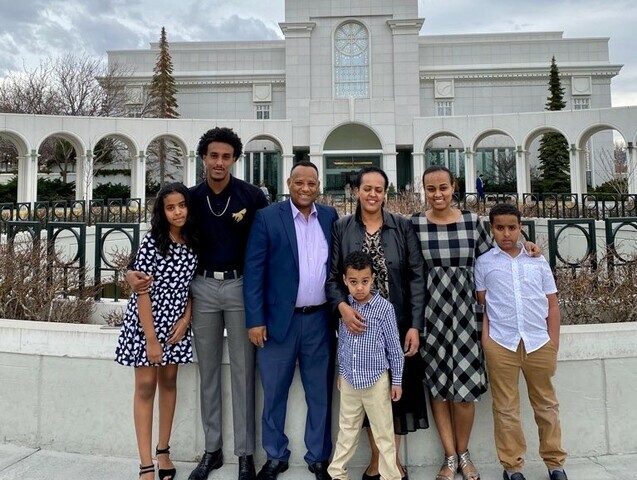Rochelle Sellers sat in the Tokyo Japan Temple, slowly rocking a baby all dressed in white. In a room nearby, the baby’s parents were receiving their temple endowments. Neither Rochelle nor the baby’s parents were from Japan, but God’s plan had somehow brought them all together in that place. Soon the family would be sealed for time and all eternity. As Rochelle rocked and looked down at the baby in her arms, she had an overwhelming spiritual impression that said, “This little girl is going to do great things for her people.”
Just one day later, the family would return to Ethiopia, more than 6,000 miles away from where they knelt to be sealed in Japan. When they landed, the mother, Betelhem (Betty) Zermariam, was quickly called to be the branch’s Relief Society president, marking the beginning of the family’s lives as modern-day pioneers for the Church in their country.
That sacred day in Tokyo was over 20 years ago, and Rochelle’s impression has materialized in more ways than perhaps anyone imagined—but not just through the work of the baby girl. Betty and her husband, Woudneh Redahegn, have strengthened the Ethiopian Saints both temporally and spiritually in many ways.
So how did two people from Ethiopia meet in Japan, join the Church, connect with and befriend Rochelle, and become spiritual, cultural, and temporal ambassadors for their country? Perhaps Betty offers the best explanation: “God’s hand is in it.”
Meeting Each Other and the Missionaries
Betty grew up in the capital city of Ethiopia, Addis Ababa, but Woudneh was raised in a village about 55 miles outside of the capital. The two didn’t meet until each had moved to Tokyo, Japan, to pursue different work opportunities and mutual friends brought them together.
“It was a miracle. So when people ask me why I went to Japan, I say, ‘I think to meet my husband,’” Betty says.
While they were dating in Tokyo, Woudneh and Betty both began to miss the religious culture they had known in Ethiopia.
“In Tokyo, people are not really religious. [But] in Ethiopia, I’ve never heard of an atheist—everybody knows God. They are Muslims or Christians,” Betty explains. “So it was hard for us to be [in Japan] because in the country we come from, there is church everywhere. It was a little hard for us to find a church.”
That changed when Woudneh and Betty attended a restaurant grand opening for fun. The local Latter-day Saint missionaries had seen a flyer for the event and thought it would be a great opportunity to find people to talk to. They were right.
Woudneh and Betty ran into the missionaries, who eagerly invited them to church. Woudneh had actually spoken with Latter-day Saint missionaries in Ethiopia, but he hadn’t been interested in learning more at the time. For the next year, however, Betty and Woudneh attended a Latter-day Saint ward, met with missionaries, and read from the Book of Mormon. Once they had finished the book, they made the decision to be baptized and were married in 2000 by their soon-to-be bishop.

Since neither Betty nor Woudneh spoke Japanese, they joined an English-speaking ward that had several American members. It was there that Betty and Rochelle would create a friendship that would not only greatly bless their own lives, but eventually the lives of hundreds in Ethiopia.
► You may also like: After 29 years, this man sent a Facebook message to a high school friend asking for help. Here's how it led to his baptism
Hope Arising
“When she comes and visits me, we will sit and talk [for] like seven or eight hours—that is normal,” Betty says with a laugh about her friend Rochelle.
Rochelle and her family are originally from Arizona, but work opportunities had brought them to Japan. The two women became so close in their ward that Betty asked Rochelle to be the one to hold their baby daughter in the temple while she and Woudneh received their endowments.
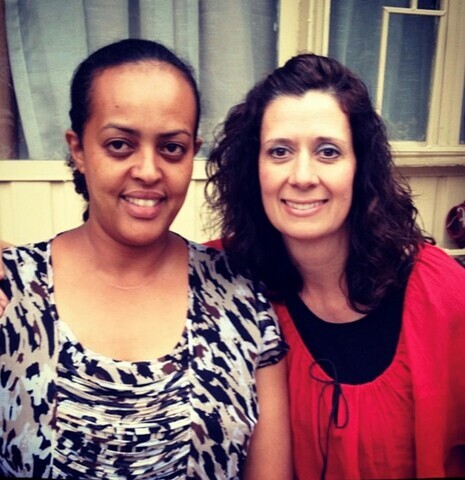
“Betty is more than just my friend; we consider each other like sisters. I adore her. She is such a good mother and a wonderful disciple of Christ,” Rochelle says. “We have the best talks. She is just something else, and I feel like the Lord brought us together for a reason.”
Betty and Woudneh returned to Ethiopia in 2002, and Rochelle and her family moved back to Arizona in 2005, but they stayed in touch. And, perhaps sooner than they thought, their paths crossed again.
For his Eagle Scout project in 2007, Rochelle’s oldest son, Collin, raised money to provide a computer and a copy machine for the elementary school Betty’s children were attending in Ethiopia. Collin also raised money to provide Sunday clothes and new sets of scriptures for the young men in their Ethiopian branch to help them prepare for missions. When everything was ready, Collin and Rochelle took what would become a life-changing trip to Ethiopia to deliver the items.
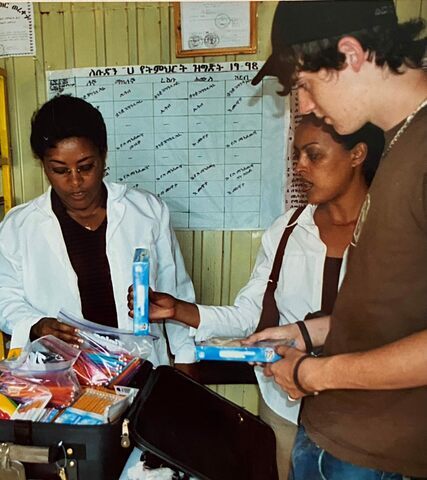
Before the trip, Rochelle and her friend Chantal Carr had been working with an organization in Mozambique focused on community development. But as Rochelle visited Woudneh’s childhood village, she told Betty that she would rather use her time and energy to work in Ethiopia with her dear friends. Betty was enthusiastic about the idea and offered to serve as the country director, a role Rochelle knew from experience is vital for an international organization to be successful, as the country director sets up all the necessary meeting within the country.
So the group applied for a nonprofit license, and Hope Arising was born.
In March 2009, Rochelle and her friend went to Woudneh’s village to explore what the newly formed organization should do first. Rochelle had in mind that Hope Arising would help orphans, but there turned out to be more a pressing need.
“We met with a lot of local leaders, and they were so happy to have us there. They were all supportive, but they were in desperate need of water,” Rochelle says.
Water was not a concern Rochelle and Chantal had addressed in their work in Mozambique, but they found a way to make it happen as they joined forces with Betty and Woudneh. Over the next three years, Hope Arising raised over $400,000, including a donation from Latter-day Saint Charities, to purchase the pipes needed to bring water into the village. Rochelle noted that Betty and Woudneh’s position as pillars in the community gave the organization credibility and encouraged cooperation with local leaders.
Since then, Hope Arising’s mission has become to inspire hope by increasing self-reliance. It provides dental and medical care, runs literacy and education programs, and offers microloans to help people start their own businesses. During her time as country director, Betty facilitated everything within the country while Rochelle and Chantal organized volunteers and donors.
“It’s our culture and our religious perception that we like serving people,” Betty says. “If a guest comes to your house, we give them our bed and we sleep on the floor. I think it’s like serving like Christ.”
Bringing Ethiopia to Utah
After living in Ethiopia for 15 years, Betty, her husband, and their five children all now live in the United States. When Betty’s family moved to Utah, she became the executive director of Hope Arising. “She’s come full circle,” Rochelle says.
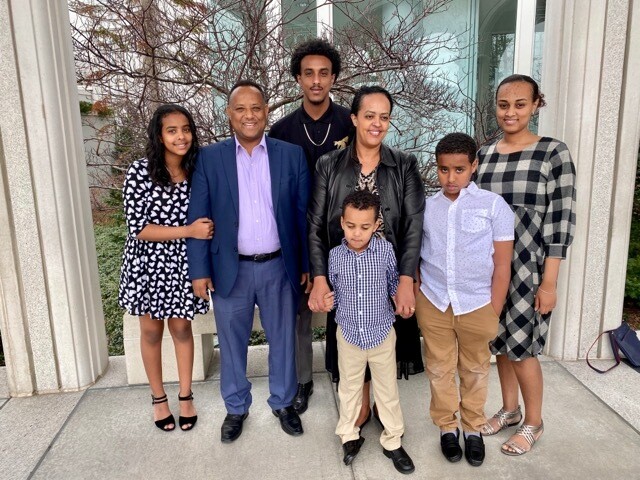
And while Ethiopia may be over 8,000 miles away, Betty is passionate about sharing the culture she loves with her new neighbors.
“After we moved here, I always wanted to teach my culture and was looking for a way how,” Betty says. “Most people. . .think Africa is one country. So by [sharing] Ethiopian food or traditional dances, people can ask me questions and I can explain. We are from Africa, and [Ethiopia] is a developing country, but there always are good things from any country. I have to show them that because the media doesn’t.”
Betty has given presentations at her children’s elementary schools about Ethiopia, operates a catering business out of her home called Betty’s Ethiopian Cuisine, and has invited her neighborhood to sample her cooking. She also runs a popular YouTube channel where she posts cooking tutorials for favorite Ethiopian dishes. Her internet presence isn’t limited to YouTube, either; she occasionally holds online cooking classes as well. And while anyone is welcome to tune in, Betty has a particular audience in mind: families with children adopted from Ethiopia.
Becky and Brian Neville, friends of Betty and Woudneh, adopted their daughter Bilise from Ethiopia in 2014—and Becky notes that it was Woudneh’s work with American agencies that made the adoption possible.
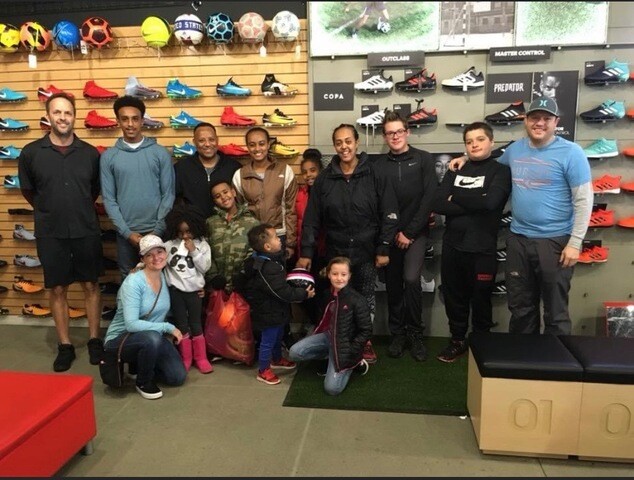
The Nevilles with Betty and Woudneh's family
“We’ve just always felt a huge debt of gratitude for them and their family,” Becky says. The Nevilles first met Woudneh when they went to Ethiopia for the adoption, but now the two families are in the same ward in Utah.
“My daughter loves Ethiopian food, and Betty is known all over the United States. . . she’s just kind of amazing,” Becky says. “Wherever you go there is going to be an Ethiopian community, and everybody knows her because she’s always posting how to make certain things. Everyone loves her.”
Betty’s 13-year-old daughter, Hermon, has also found a way to be a blessing to the Ethiopian community in the United States: she teaches traditional tribal dances to children adopted from Ethiopia.
“They’re adopted [and] their parents don’t know a lot about their culture, so I get to teach them more about it. They are born there, so I feel like they should know where their roots are from,” Hermon says.
Last summer, Hermon taught six students one-on-one via Zoom and is looking forward to doing so again this year.
Ethiopian Saints: Modern-Day Pioneers
The portion of the population in Ethiopia who are members of the Church is just 0.002 percent, according to Newsroom, with 1,803 members of the Church organized into four congregations. Ethiopia was part of the Kenya Nairobi Mission, which was created in 1991, and the first official church meeting was held in the capital city, Addis Ababa, in August 1992. Last July, the Ethiopia Addis Ababa Mission was established.
“It’s like a pioneer time for us. I know the Church is big in Utah, but [in Ethiopia] it’s very small. Like how the pioneers had lots of struggles, it’s not easy,” Betty says.
Betty has seen firsthand how being a pioneering member of the Church in an area where the gospel is relatively new can be difficult. Members often have to travel great distances to minister or attend church, and cultural beliefs and language barriers slow down missionary work. Yet on Rochelle’s many visits to Ethiopia, she has felt humbled and impressed by the example of faithful Ethiopian Saints.
“I don’t even know how to describe it,” she says. “I’m just so in awe of their faithfulness and their dedication. … I’ve had a couple experiences where I’ve just broken down sobbing and said, ‘Why does life have to be so hard for some people? Why do they have to sacrifice so much to be part of the gospel?’ It’s not like they can just get in their car and drive to church. It’s a sacrifice. [But] the Lord has told me, ‘Hey, I am aware. They are mine and my eye is on them.’ I am always assured that the Savior is going to make things right.”
One of the ways Betty has furthered the Lord’s work in her country is helping to translate the Doctrine and Covenants into Amharic, one of the languages spoken in Ethiopia. The process took eight years to complete. As an ecclesiastical reviewer, she provided feedback to the translators and when the translation was completed three years ago, Betty was given one of the first copies. Today, Betty works for the Church, which includes translating general conferences addresses into Amharic.
‘Not a Coincidence’
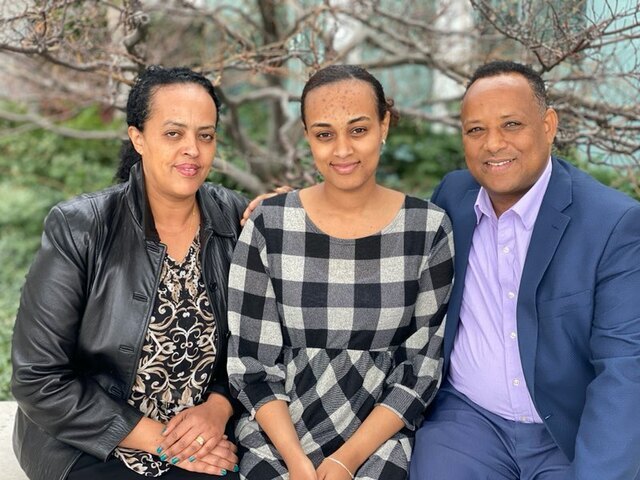
The young baby Rochelle once held in the Tokyo Japan Temple, Yodahe, is now working to bring other families to the temple as a missionary in Nevada. She will return home in September.
“I feel like the Lord brought us together for a reason,” Rochelle says. “There’s just been too many times where the Lord has let me know this is not a coincidence. [He’s said,] ‘I am putting people in your path and putting you in their path so I can get my work done here.’”
And for Betty, that work is all about service and respecting the beauty of the gospel and cultures throughout the world.
“In Ethiopia most people are religious—we have a fear of God. When you have a fear of God, you respect people and you want to share what you have. I think that that’s it. We respect everybody, we see everybody equal, and we are proud of our country.”

